We’re told by doctors and nutritionists that if we want to stay healthy we should avoid egg yolks. They’ve created such fear in people that we’re seeing egg-white omelettes on “healthy” menus at restaurants, Egg Beaters, and liquid/powdered egg whites across grocery store shelves. Let’s think about this using common sense- people have been eating eggs for thousands of years and eggs are real foods that are found in nature. I love this quote from Liz Wolfe’s Eat The Yolks, “Mother Nature’s no dingbat. She didn’t package the good stuff with the bad stuff so she could watch us struggle for thousands of years until the invention of Egg Beaters.” In fact, the yolk is where most of the nutrition is. It’s what makes eggs the fantastic health food they are.
Egg yolks contain all of the fat soluble vitamins A, D, E, and K, which need fat in order to be properly absorbed and utilized by the body (see how smart Mother Nature is?!) Egg yolks also contain carotenoids, lutein, zeaxanthin, calcium, iron, magnesium, phosphorous, potassium, sodium, zinc, selenium, folate, choline, saturated fat, cholesterol (not a bad thing! see why here), thiamin, vitamin B6 and B12, and, when raw, omega 3 and omega 6 fatty acids. The egg white just has the protein (and protein is better absorbed when eaten with fat- again, Mother Nature is smart), and actually is the part of the egg that can cause problems for people who are sensitive/allergic to eggs.
People with poor gut health and/or autoimmune disease are better off avoiding egg whites. The white part of the egg is there to protect the growing chick (yolk), so some of its defenses can cause problems for sensitive people. As for quality, you want to make sure your eggs come from chickens that are pasture-raised/grass-fed, so they have freedom and get to eat bugs (chickens are NOT vegetarians). It can be difficult to find high quality eggs since there is much confusion on egg labels. An easy way to know if you have a great, nutrient-dense egg is to notice the orange color of the yolk, rather than yellow. Of course, you won’t know until you crack open the eggs, so you’ll want to look for a trustworthy source to buy your eggs from, or even consider getting some chickens for your backyard (it’s becoming pretty popular to do that lately). Local farmer’s markets or Whole Foods are great places to find pasture-raised eggs.
Guide to Egg Labels
Vegetarian Fed: Like I’ve already mentioned, chickens are NOT vegetarians. I don’t know why they insist on feeding animals an improper diet. Chickens are omnivores- they belong on pasture, with freedom to roam around, where they can eat grass and worms. (While we’re on the subject, cows should eat grass, not corn). Eggs that say “Vegetarian Fed” are not the best choice.
Cage-Free: Cage-Free means that the chickens are not kept in cages, so they are able to move around inside of the hen house. However, this does not mean that they have access to the outdoors and to pasture. Also, they are normally still in cramped conditions.
Free-Range: Free-Range means that the chickens are allowed access to the outdoors for at least part of the day. Part of the day could mean as little as 5 minutes since there are no strict government regulations on the terms for egg labels.
Certified Organic: Certified Organic means that chickens are in barns, uncaged, and required to have some access to the outdoors.
Farm Fresh: This label basically means nothing, there is no regulations on it.
Pasture-Raised: This is the label you want to look for while shopping for eggs. These chickens are able to forage outdoors and eat their natural diet that includes: bugs, worms, grass, and seeds.
The best choice is to get eggs that are free-range, organic, and pasture-raised from your local farmer’s market, Whole Foods Market, or from your own backyard hens.
The easiest approach to eating healthy is to think to yourself, “is this a real, whole food that is found in nature?” We run into problems when we try to outsmart nature (ya know- feeding animals an improper diet, and only eating the egg whites). Mother Nature knows what she is doing. So eat foods that have always been food and give your body the nutrition it needs. Stop the madness and eat the yolks!
Was this information useful to you? Let me know in the comments!
See also:
What’s the Deal with Omega 3?
Benefits of Grass-Fed Butter
Saturated Fat Does NOT Make You Fat
Stop Fearing Cholesterol!
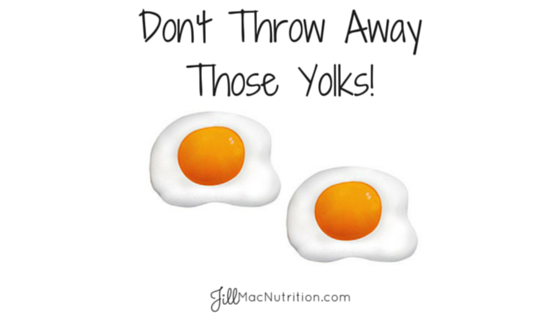
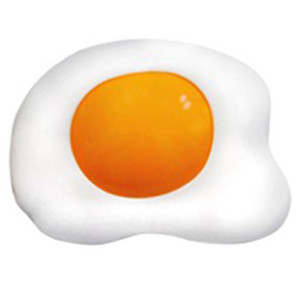
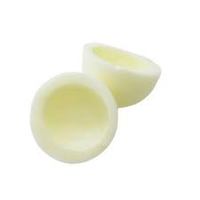
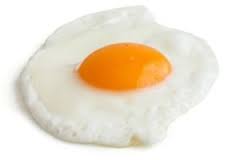

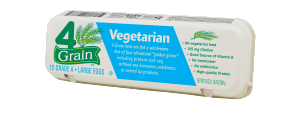
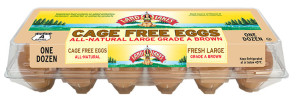
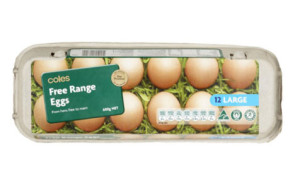
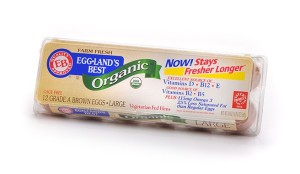
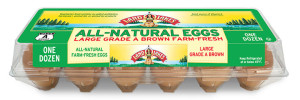
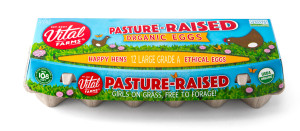
6 comments